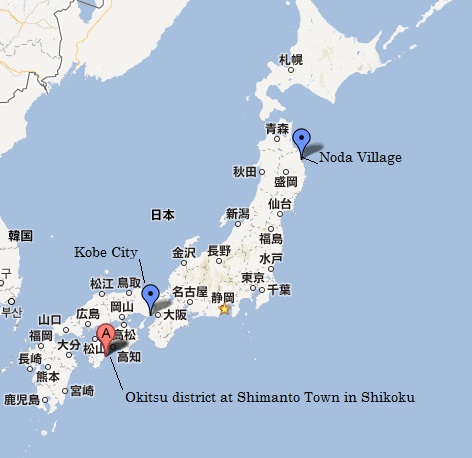
Katsuya Yamori (Disaster Prevention Research Institute,
Kyoto University)

In August 2011 elementary school children from Noda Village in Iwate
Prefecture, an area affected by the Great East Japan Earthquake, were invited
to Kobe to spend a few days during their summer vacation. This event was mainly
organized by university students in Kobe studying disaster prevention and a citizen
volunteer group “Kataribe Kobe 1995”,
which I had established in cooperation with the victims of the Great Hanshin –Awaji
Earthquake. Kataribe Kobe 1995 (referred
to hereafter as Kataribe) is a group whose
mission is to pass on personal experiences and lessons learned from the Great
Hanshin –Awaji Earthquake through storytelling and oral history.
Later that year in December 2011, the
members who organized the event in Kobe visited
Noda Village for a reunion. The university students and elementary school
children played dodge ball and barbecued, while the grown-ups enjoyed karaoke .They all had great fun. The
members of Kataribe also held a
special class at the elementary school on the theme of “Children who experienced
the Great Hanshin-Awaji Earthquake”
Seventeen years ago, when the Great
Hanshin-Awaji Earthquake occurred, all the members of Kataribe were suffering the immediate aftermath of the earthquake. Even
now they have not completely overcome their pain. Their hard experiences led
them to Noda Village. They wanted to tell the people in Noda Village what they
had experienced in the earthquake and how they lived their 17 years.
At that time, seventeen years ago all of
today’s university students volunteers were under school age. They have dim
memories of the Kobe earthquake. Education is their substantial source of
knowledge about the earthquake. These facts, however, strongly motivated them
to encourage the children at Noda Village as they continue to live on after a
major disaster. The university students brought photo albums to the children of
Noda Village as their gifts. The photos were taken in Kobe during the children’s
summer visit and compiled into an album for each child. It is hoped that the
children would treasure these one-and only albums all through their lives.
This year at 5:46 am on January 17th,
at the same time as the Great Hanshin –Awaji Earthquake had struck seventeen
years ago, I was at Higashi Yuenchi Park in Chuo Ward of Kobe City, where an
annual memorial ceremony was held. Some residents of Noda Village attended the ceremony,
including Mr. Masaru Onodera who is a member of the Board of Education at Noda
Village, and who had led the school children to Kobe during their summer vacation.
The Nippon Volunteer Network Active in Disaster (NVNAD), of which I am a
member, invited them so they could personally experience the annual January 17th memorial.
Furthermore in February 2012 I invited Mr.
Onodera to Okitsu district at Shimanto Town in Shikoku and to Suma Ward in Kobe
City and asked him to talk about the experience of the March 11 earthquake
and tsunami. Okitsu district is the village where I have been engaging in tsunami
preparedness project with the residents for many years. Recently Japanese Government
Panel has announced the highest estimated tsunami could reach over 25meters in
Okitsu in case of the earthquakes along the Nankai Trough. As this area is vulnerable
to tsunami, I have long wanted the residents to have a chance to listen to the
experience of March 11th directly from the victims. My wish finally
came true.
At the other location in Suma Ward of Kobe
City, a district which was severely damaged by the Great Hanshin-Awaji Earthquake,
a member of Kataribe serves as a
leader of a community association at Suma Ward in Kobe City. According to this person, these days
residents often move in and out in this district and he expressed concerns that
public awareness for disaster prevention has been diminished. So I requested him
to organize a meeting where Mr. Onodera could meet and talk with the residents.
I am sure this helped remind the residents of the importance of disaster
prevention. I also appreciated the fact that a resident in Suma Ward who is originally
from Noda Village participated in the meeting.
Recently natural disasters such as earthquakes,
typhoons, and floods have been very frequent .While I hope their frequency will
decline; I also think we need to take some measures to create better conditions
out of hard realities and learn a lesson from disastrous damage. A lot of
disasters in Japan have brought forth many people who have vivid memories of
their trying experiences. What is important is to pass on the victims’
experiences from one place to another, from generation to generation, from
person to person before those memories perish. This is why I am trying to bridge
the various disaster affected areas; from Hanshin- Awaji to Tohoku, from Tohoku
to Hanshin area and then to Shikoku. This determination also led me to develop
a plan to make links over time as well, from the past to the present and to the
future.
On March 11th, 2012 I was at
Noda Village. I had already visited Noda Village more than ten times since the
disaster. I saw Mr. Onodera and other members with whom we had deepened ties since
last summer. One year had passed since the earthquake. Outside of the hall
where a memorial service was being held, icy snow was falling.